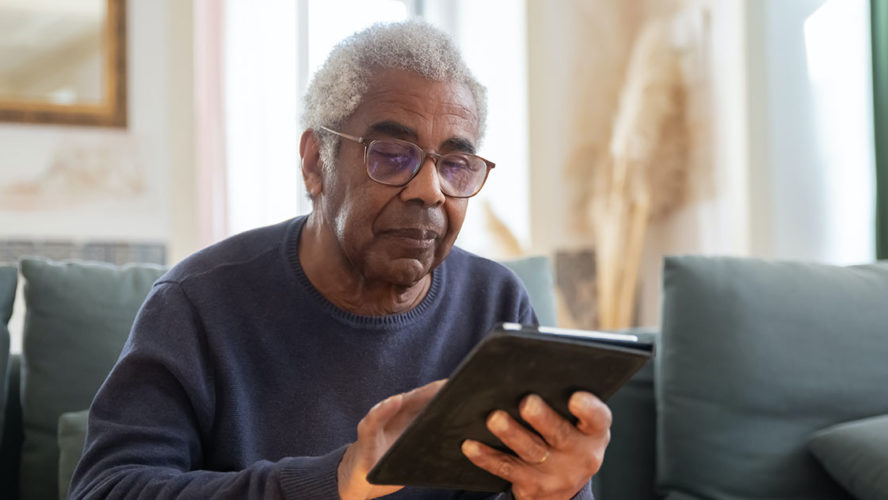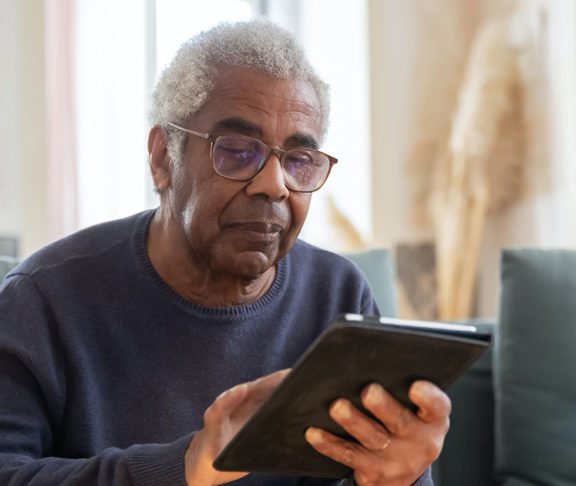Cancer and its treatment can be emotionally exhausting. Prescription digital therapies can help patients take back control.
Cancer afflicts more than 1.6 million Americans annually. Treatments for cancer can be physically exhausting—but cancer’s emotional toll is too often overlooked or under addressed.
“Anxiety and depression are considerably higher in patients with cancer compared with the general public. In fact, more than half of the people diagnosed with cancer have clinically significant levels of distress,” says Sean Zion, Ph.D., virtual trial lead and senior manager of behavioral science at Blue Note Therapeutics. “Unfortunately, for far too many patients,these symptoms go untreated.”
Ricki Fairley, who was diagnosed with stage three triple-negative breast cancer, knows that better than most. Her story is eye opening to the pervasiveness of cancer in all aspects of a patient’s life.
Emotional impact
After Fairley, CEO of Touch, The Black Breast Cancer Alliance (TOUCHBBCA) and patient advisor to Blue Note Therapeutics, was diagnosed with breast cancer she underwent a double mastectomy, six rounds of chemotherapy, and six weeks of radiation — only to have her cancer return a year later. “My doctor said ‘Ricki, you have two years to live,’” Fairley recalls. “I said, ‘I can’t really die right now. We need to work something out.’”
Fairley says what people don’t understand about cancer is that the anxiety is constant. “You’re always thinking about it — you think about it when you wake up in the morning, the first thing you think about is gosh, I have cancer. I could be dying. And it’s pervasive.” And the stress doesn’t end when treatment does. “The thought of recurrence is always there,” she says.
Taking control
Fairley was introduced to Blue Note Therapeutics, a company dedicated to easing the burden of cancer, and their prescription digital therapy apps, by her nurse navigator. The company takes face-to-face, cancer-specific therapies and recreates that experience in a digital format that can be used by patients “on demand” from the comfort of their home.
“Prescription digital therapeutics are software-driven therapeutic devices aimed at helping patients manage medical conditions or diseases,” Zion explains. In the case of cancer-related anxiety and depression, these digital tools can help enable patients to better manage the unique emotional challenges of cancer.
“The therapy was really, really helpful because it helped me realize that I was creating my own stress by making people dependent on me,” Fairley says. “What I learned was that not only did I have a cancer in my body, I had a lot of cancers in my life that I had to get rid of.”
Through the digital therapy app, Fairley developed lifelong skills that helped her manage her stress and emotions—like breathing exercises she calls her “fast fix” for stress. “To have control over something when you have cancer is a great thing,” Fairley says. “Because there are not too many things you can control.” The fact that the program is available as an app on any mobile device means support and treatment are available at any time, even in the middle of the night.
Virtual trial
Zion is also excited about Blue Note Therapeutics’ newly launched virtual clinical trial which can be completed 100 percent from home, with no in-person medical visits. The clinical trial is studying the impact of two digital therapy apps on the physical and mental health of patients living with cancer. “Running an in-person study involves a lot of people on the ground recruiting and enrolling patients in the hospital,” he explains. “The products we’re studying here are digital apps that can be used at home. This offers patients a more convenient way to participate and enables access to a patient population that may otherwise be underrepresented.”
Fairley encourages anyone living with cancer to look for tools like prescription digital therapies. “Minimize your stress as much as you can — get rid of it!” she urges. “Because anxiety does not help healing.”


